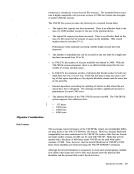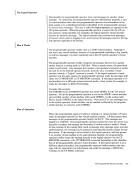INIT2
CHECKCKON CKOFF UREC CALOC machine. Thus, the first initialization routine initializes DMSFRE so
that limited functions can be requested, while the second initialization
routine performs the initialization necessary to allow the full functions
of DMSFRE to be exercised.
invokes the second initialization routine. This routine is invoked after
the size of virtual storage is known, and it performs initialization nec
essary to allow all the functions of DMSFRE to be used. The second
initialization routine performs the following steps:
Releases all storage that has been allocated in the high storage
area.
Allocates the FREET AB free storage table. This table contains
one byte for each 4K page of virtual storage, and so cannot be
allocated until the size of virtual storage is known.
The FREET AB table is initialized, and all storage protection keys
are initialized.
invokes a routine that checks all free storage pointer chains for con
sistency and correctness. Thus, it checks to see whether or not any
free storage pointers have been destroyed. The option can be used at
any time for system debugging.
turns on a flag that causes the CHECK routine to be invoked each
time a call is made to DMSFREE or DMSFRET. This can be useful
for debugging purposes (for example, when you wish to identify the
routine that destroyed free storage management pointers). Care
should be taken when using this option, since the CHECK routine is
coded to be thorough rather than efficient. Thus, after theCKON option has been invoked, each call to DMSFREE or DMSFRET will
take much longer to be completed than before.
turns off the flag that was turned on by theCKON option.
is used by DMSABN during the abend recovery process to release all
user storage.
is used by DMSABN after the abend recovery process has been com
pleted. It invokes a routine which returns, in register0, the number of
doublewords of free storage that have been allocated. This number is
used by DMSABN to determine whether or not the abend recovery
has been successful.
TYPCALL=[SVC ]
BALR
indicates how control is passed to DMSFRES. Since DMSFRES is a
nucleus-resident routine, other nucleus-resident routines can branch
directly to it (TYPCALL=BALR), while routines that are not
nucleus-resident must use SVC linkage (TYPCALL=SVC).
Functional Information 331
CHECK
that limited functions can be requested, while the second initialization
routine performs the initialization necessary to allow the full functions
of DMSFRE to be exercised.
invokes the second initialization routine. This routine is invoked after
the size of virtual storage is known, and it performs initialization nec
essary to allow all the functions of DMSFRE to be used. The second
initialization routine performs the following steps:
Releases all storage that has been allocated in the high storage
area.
Allocates the FREET AB free storage table. This table contains
one byte for each 4K page of virtual storage, and so cannot be
allocated until the size of virtual storage is known.
The FREET AB table is initialized, and all storage protection keys
are initialized.
invokes a routine that checks all free storage pointer chains for con
sistency and correctness. Thus, it checks to see whether or not any
free storage pointers have been destroyed. The option can be used at
any time for system debugging.
turns on a flag that causes the CHECK routine to be invoked each
time a call is made to DMSFREE or DMSFRET. This can be useful
for debugging purposes (for example, when you wish to identify the
routine that destroyed free storage management pointers). Care
should be taken when using this option, since the CHECK routine is
coded to be thorough rather than efficient. Thus, after the
take much longer to be completed than before.
turns off the flag that was turned on by the
is used by DMSABN during the abend recovery process to release all
user storage.
is used by DMSABN after the abend recovery process has been com
pleted. It invokes a routine which returns, in register
doublewords of free storage that have been allocated. This number is
used by DMSABN to determine whether or not the abend recovery
has been successful.
TYPCALL=
BALR
indicates how control is passed to DMSFRES. Since DMSFRES is a
nucleus-resident routine, other nucleus-resident routines can branch
directly to it (TYPCALL=BALR), while routines that are not
nucleus-resident must use SVC linkage (TYPCALL=SVC).
Functional Information 331



































































































































































































































































































































































































































































































































































































































